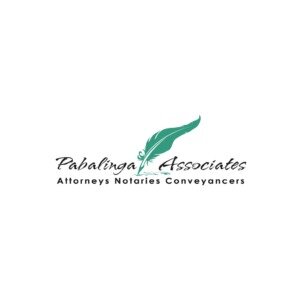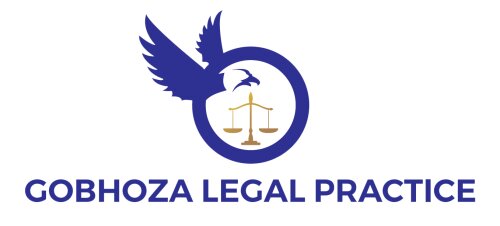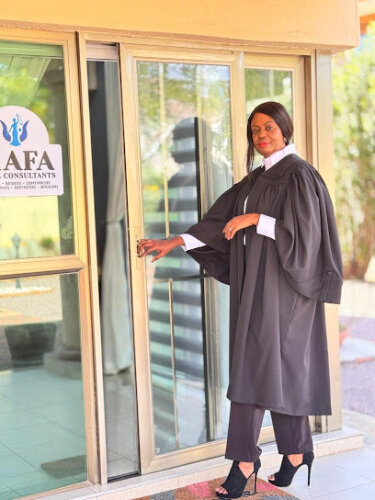Best Conveyancing Lawyers in Botswana
Share your needs with us, get contacted by law firms.
Free. Takes 2 min.
Free Guide to Hiring a Real Estate Lawyer
Or refine your search by selecting a city:
List of the best lawyers in Botswana
About Conveyancing Law in Botswana
Conveyancing in Botswana refers to the legal process of transferring the ownership of immovable property, such as land and buildings, from one party to another. This process involves preparing, verifying, and registering the necessary legal documents to ensure a clear and lawful change of ownership. Conveyancing is a highly regulated field in Botswana, with strict laws and procedures to ensure the protection of all parties involved in property transactions. Qualified conveyancers, who are typically legal practitioners, play a vital role in facilitating these transactions and ensuring compliance with local law.
Why You May Need a Lawyer
There are several scenarios in which you may require the assistance of a conveyancing lawyer in Botswana. Some common situations include:
- Selling or purchasing residential, commercial or agricultural property
- Registering a mortgage or bond over a property
- Transferring property due to inheritance, divorce or donation
- Resolving disputes or verifying title deeds
- Assisting with sectional title or lease agreements
- Advising on land tenure and related rights
- Rectifying errors in property records
- Clarifying boundary or zoning issues
These transactions often involve significant investments and legal complexities. A lawyer ensures all documentation is accurate and compliant with Botswana’s laws, helping to prevent fraud, disputes, or costly mistakes.
Local Laws Overview
Property law and conveyancing in Botswana are primarily governed by the Deeds Registry Act, the Land Control Act, the Tribal Land Act, and various regulations set out by the Deeds Registry Office. Foreign ownership, urban versus tribal land, and land tenure are all important considerations under Botswana's legal framework.
- The Deeds Registry Act dictates the registration system for lands and properties and sets out the requirements for proper transfer and registration of ownership.
- The Tribal Land Act is pertinent for transactions involving tribal land, which is administered by local land boards on behalf of the communities.
- Freehold, leasehold, and customary tenure are all recognized forms of land holding in Botswana, with different procedures for conveyance in each case.
- Foreigners are generally permitted to purchase property, but may face additional requirements or restrictions, especially concerning tribal land.
- All property transactions must be recorded with the Deeds Registry Office for the change in ownership to be effective and enforceable.
Frequently Asked Questions
What is conveyancing?
Conveyancing is the legal process of transferring ownership of immovable property from one person or entity to another, involving the preparation of documents, due diligence, and registration at the Deeds Registry Office.
Do I need a lawyer for conveyancing in Botswana?
While it is not mandatory for all transactions, it is highly advisable to use a qualified conveyancer or lawyer to ensure that the transfer is legal, valid, and properly registered.
How long does the conveyancing process take?
The timeline varies, but a straightforward conveyance can take anywhere from two to six months, depending on the complexity of the transaction and the efficiency of documentation, clearance certificates, and registration processes.
What is the Deeds Registry Office?
The Deeds Registry Office is the government authority responsible for registering all property ownership transfers, mortgages, and related documents in Botswana.
Can foreigners buy property in Botswana?
Foreigners are generally allowed to purchase property in Botswana but may need special approval for tribal land and must comply with all applicable laws and procedures.
What are the costs associated with conveyancing?
Buyers and sellers typically incur legal fees, transfer duties, registration fees, and search fees. These can vary depending on the value and location of the property.
What documents are needed to transfer property?
Commonly required documents include the original title deed, sale agreement, identity documents, tax clearance certificates, and relevant consents from authorities such as land boards (for tribal land).
Are there restrictions on selling tribal land?
Yes, tribal land is not owned outright but allocated under customary law. Transfers usually require approval from the relevant land board and must comply with the Tribal Land Act.
Can property be transferred as part of an inheritance?
Yes. Inherited property must be transferred to beneficiaries through a legal process, which may involve court orders, proof of death, and clearance of inheritance taxes or duties.
What happens if there is a dispute over property boundaries?
Disputes over boundaries or ownership can be resolved by a court of law or, in some cases, by land boards in the case of tribal land. Legal representation is recommended during such disputes.
Additional Resources
If you are seeking further guidance or need to verify property information, the following resources and bodies are useful:
- Deeds Registry Office - For property title searches and registration queries
- Ministry of Lands and Water Affairs - For policies, land tenure information, and regulatory guidance
- Local Land Boards - For matters involving tribal land allocation and transfer
- Botswana Law Society - For finding registered conveyancing lawyers
- High Court or Magistrate courts - For resolving complex property disputes
Next Steps
If you require assistance with conveyancing in Botswana, consider the following steps:
- Identify the nature of your property transaction and gather all necessary documents.
- Contact a registered conveyancing lawyer or law firm with experience in Botswana property law.
- Schedule a consultation to discuss your needs, costs, and timelines.
- Allow your legal representative to conduct due diligence, prepare paperwork, and handle communication with relevant authorities.
- Ensure you understand all fees, duties, and taxes involved before signing any documents.
- Follow your lawyer's guidance to finalize the transfer and ensure registration at the Deeds Registry Office or the appropriate land board.
By seeking professional assistance early, you can avoid common pitfalls and ensure a smooth, lawful transfer of property in Botswana.
Lawzana helps you find the best lawyers and law firms in Botswana through a curated and pre-screened list of qualified legal professionals. Our platform offers rankings and detailed profiles of attorneys and law firms, allowing you to compare based on practice areas, including Conveyancing, experience, and client feedback.
Each profile includes a description of the firm's areas of practice, client reviews, team members and partners, year of establishment, spoken languages, office locations, contact information, social media presence, and any published articles or resources. Most firms on our platform speak English and are experienced in both local and international legal matters.
Get a quote from top-rated law firms in Botswana — quickly, securely, and without unnecessary hassle.
Disclaimer:
The information provided on this page is for general informational purposes only and does not constitute legal advice. While we strive to ensure the accuracy and relevance of the content, legal information may change over time, and interpretations of the law can vary. You should always consult with a qualified legal professional for advice specific to your situation.
We disclaim all liability for actions taken or not taken based on the content of this page. If you believe any information is incorrect or outdated, please contact us, and we will review and update it where appropriate.
Browse conveyancing law firms by city in Botswana
Refine your search by selecting a city.

















